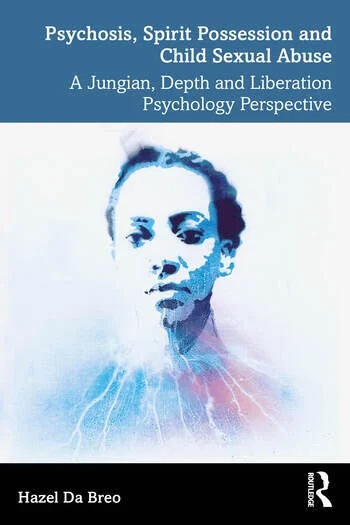Psychosis, Spirit Possession and Child Sexual Abuse: A Jungian, Depth and Liberation Psychology Perspective

Book Details
- Publisher : Routledge
- Published : 2024
- Cover : Paperback
- Pages : 166
- Category :
Jung and Analytical Psychology - Catalogue No : 97916
- ISBN 13 : 9781032122113
- ISBN 10 : 1032122110
Reviews and Endorsements
This unique and pioneering work embarks on a bold exploration of the complex intersections between mental health, spiritual experiences, and the trauma of child sexual abuse. Hazel Da Breo's insights and compassionate approach offer hope and understanding for those navigating the aftermath of profound trauma. Arising from decades long work as a psychologist and heavily influenced by phenomenology and spirituality, her work is not only an academic and therapeutic achievement but also offers deeply moving narratives that honor the lived experiences of survivors. As a Co-Founder of an organization dedicated to combating violence against women and girls as an issue of structural discrimination, I believe Da Breo's contribution to our understanding of trauma and the paths to recovery is significant. I believe that this book will be an invaluable resource for therapists, survivors, scholars, activists, and anyone committed to the deep work of healing and liberation.
Jaspreet Singh, JD, Co-Founder, ICAAD
Page by page Hazel Da Breo in Psychosis, Spirit Possession and Child Sexual Abuse: A Jungian, Depth and Liberation Psychology Perspective, challenges our view of trauma or better said our view of an objective reality. She argues our heuristic scientific training as therapists detaches and distances us from our child abuse patients’ experience and our own humanity. It denigrates insights of thinkers such as Jung and Fanon, Sufi Emmanuel Vaughan-Lee and Jean-Martin Charcot. She, as a fellow traveler among them, is an unapologetic phenomenologist. She places the lived experience of our patients, from the banal and quotidian to the worrisome and terrifying to the pleasurable and numinous, at the core of how we can help resolve their suffering. She presents us with accounts of ten children, each of whom jumps to life in her telling. They have experienced terrible acute experiences and chronic dysregulating quotidian experiences. The chronic experiences are what I call the in-between times. The in-between times are the child’s reiterated moment-by-moment growth distorting, benign or growth enhancing experiences with others that fill the child’s life between the acute events. It is repetition of the banal experiences of the child in the in-between times that sculpt how the child sees the world and her way of being in the world.
Simultaneously, as Da Breo gets us inside the child to see how the child experiences the world, rather than how we would see the child’s world, she raises our thinking to the possibility of psychosis as a cultural manifestation of spirit possession. And while admitting that the full range of specific factors that affect children of specific groups is unknown, she presses us to consider Indigenous practices, colonization, social adversity, racism, exclusion, city vs. rural living along with other factors as playing a role. Da Breo’s book will bring you back to the essence of doing the work we love. Even those of you who view children’s trauma as an objective outcome of distorted brain processes, Da Breo’s writing, even if it does not change one neural network in your prefrontal cortex, will expand how you think and work with your traumatized patients.
Ed Tronick, PhD, Professor of Psychiatry and Pediatrics, University of Massachusetts Chan Medical School

